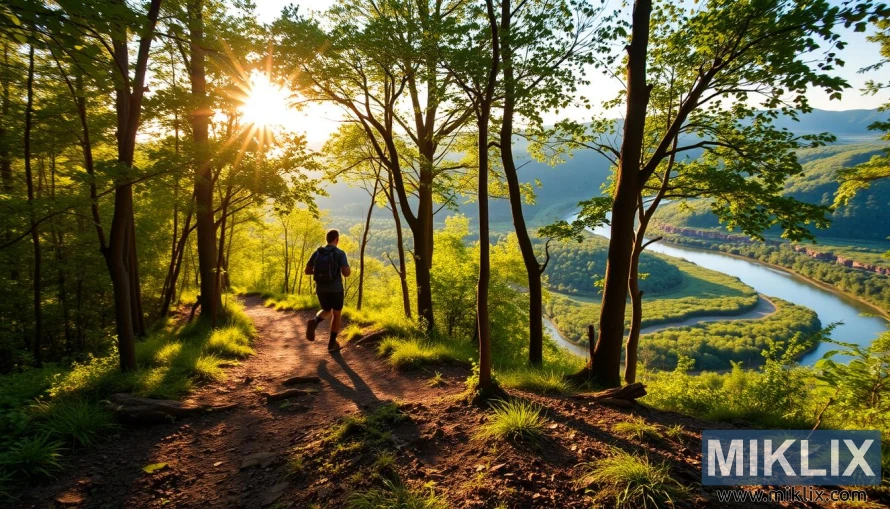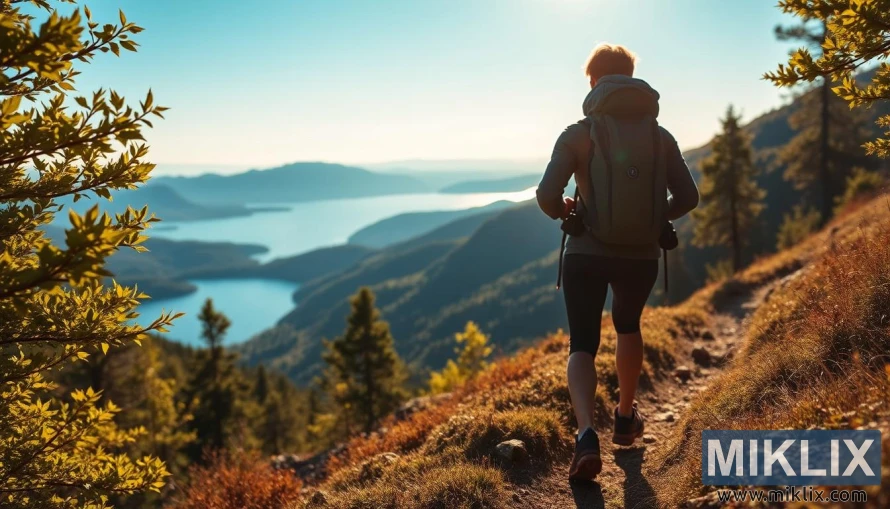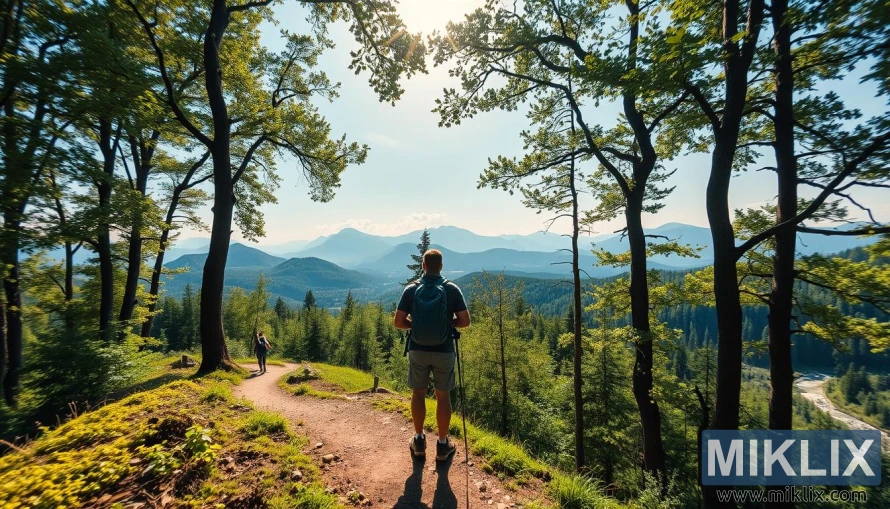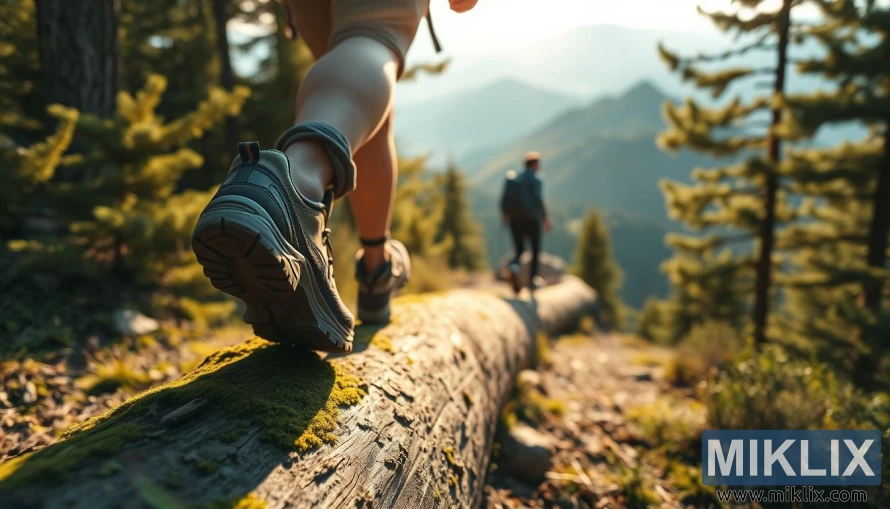Hiking for Health: How Hitting the Trails Improves Your Body, Brain, and Mood
Published: April 1, 2025 at 12:18:50 AM UTC
Hiking is more than a simple outdoor activity; it's a doorway to a wealth of health advantages. It boosts both physical fitness and mental health. As you explore various trails, you connect with nature, leading to better physical health and emotional well-being. Research shows that hiking regularly can lower the risk of chronic diseases. It also improves your mood and helps build social connections. By making hiking a part of your routine, you adopt a holistic approach to better health.
Key Takeaways
- Hiking promotes physical exercise, improving overall fitness.
- Regular hiking enhances mental health and emotional well-being.
- Engaging with nature can reduce the risk of chronic diseases.
- Hiking fosters social connections and a sense of community.
- It serves as a holistic method for improving health and well-being.
Introduction to Hiking and Its Benefits
Hiking is a captivating outdoor activity that blends the thrill of exploration with the perks of physical exercise. It can be enjoyed in various settings, from easy trails to rugged mountain paths. An introduction to hiking highlights its accessibility and the numerous benefits it provides to participants.
The advantages of hiking are vast and impact different aspects of health. It boosts cardiovascular fitness, improves mental well-being, and encourages social connections among hikers. Studies show that spending time in nature reduces stress, leading to a clearer mind. Regular hiking enhances overall well-being by helping individuals escape daily stress and connect with nature's calming aspects.
In conclusion, hiking is a fulfilling way to bond with nature, boost health, and enjoy the outdoors. It caters to all skill levels, providing opportunities for both physical and mental rejuvenation. This makes hiking an excellent choice for those seeking to enrich their lifestyle through outdoor activities.
Physical Health Benefits of Hiking
Hiking is a holistic way to boost physical health. It works out multiple muscle groups, like the legs, core, and back. This not only strengthens muscles but also enhances bone density and overall strength.
Hiking also improves balance and coordination. Walking on uneven terrain requires stability, which boosts proprioception and lowers fall risks. Regular hiking boosts fitness levels, aiding in weight management.
It also benefits respiratory health by increasing lung capacity and improving oxygen exchange. Those who hike regularly may see a decrease in respiratory problems. Hiking significantly reduces the risk of heart disease, highlighting its importance for heart health.
Studies show hiking is effective against obesity. Regular physical activity, like hiking, fights off excess weight and boosts metabolism. Adding hiking to your routine can lead to numerous physical health benefits, improving your overall quality of life.
Hiking as a Form of Exercise
Hiking is a versatile form of exercise that engages various muscle groups and cardiovascular systems. It can be tailored to suit different fitness levels, making it accessible for anyone. Whether you're on easy trails or tackling steep inclines, hiking offers a range of intensities. This allows individuals to customize their fitness journey.
Backpacks can enhance the hiking experience by adding resistance, increasing the workout's intensity. This challenges muscles and elevates heart rate, improving cardiovascular fitness and strength. The American Heart Association recommends at least 150 minutes of moderate-intensity exercise weekly. Hiking effectively meets this requirement.
- Engages core, legs, and arms for a full-body workout.
- A variety of terrains offers natural challenges and enhances endurance.
- Allows for both moderate and high-intensity hiking exercise options.
Adopting hiking as a regular fitness activity offers both physical and mental health benefits. It paves the way for a healthier lifestyle.
Mental Health Improvements from Hiking
Hiking offers substantial mental health benefits, significantly improving overall well-being. Being in nature brings a sense of peace, reducing anxiety and stress. Studies show a clear link between outdoor time and better emotional states. Nature's calming effect is a potent remedy against depression.
Combining physical activity with nature immersion on hikes promotes stress relief and positive mental health. The rhythmic walking, fresh air, and scenic views create a tranquil state. Many find this experience therapeutic, leading to a sense of relaxation and balance.
Regular hiking enhances sensory perception and serves as a space for introspection and creativity. It boosts mood and resilience against daily stress. For those looking to improve their mental health, hiking is a valuable strategy.
Relational Health and Social Benefits of Hiking
Hiking is more than a physical activity; it's a way to build stronger relationships through shared experiences in nature. When you hike with friends, family, or community groups, it can greatly improve your connections with others. These experiences not only offer emotional support but also create a sense of belonging.
The social advantages of hiking are clear. While hiking, people often engage in deep conversations, which strengthens friendships. The natural setting encourages open dialogue, leading to a deeper understanding of one another. Overcoming challenges together builds resilience, trust, and mutual encouragement.
Also, the shared experiences of hiking create lasting memories. The excitement of discovering new trails and witnessing breathtaking views creates stories that bond participants. These moments highlight the value of relational health, building a supportive community.
Addresses Weight Management
Hiking is a powerful tool for managing weight, burning calories efficiently. It's a great way to lose weight or keep it in check. On average, hikers burn about 100 calories per mile. This figure can change based on how hard you hike and your weight.
Regular hiking turns into a workout routine that boosts physical fitness. The scenery and fresh air make it enjoyable. It's more than just cardio; it's a way to manage weight holistically.
Hiking also improves overall well-being. Many people find it leads to better lifestyle choices. This supports their weight management goals even more.
Heart Health and Hiking
Hiking is essential for heart health. It offers significant cardiovascular benefits through regular aerobic exercise. This activity can lower the risk of coronary heart disease and improve overall heart function. For example, a study with over 20 million participants showed hiking can reduce all-cause mortality risk by 11% to 17%. It also decreases heart failure risk by up to 18%.
Experts recommend moderate to vigorous physical activity, like hiking, for 150-600 minutes weekly. This can lower mortality risk from all causes by 20-21%. Adding hiking to your routine boosts fitness and heart health. Regular exercise can even cut mortality risk by up to 40%, extending life significantly.
A study on women who walked regularly found a 30% lower risk of cardiovascular disease. This shows hiking aids in weight management and improves heart health. It also reduces mortality rates from heart disease.
Hiking and Its Impact on Blood Pressure
Hiking is a powerful tool for lowering blood pressure and preventing hypertension. Regular physical activity, such as hiking, has shown to significantly reduce blood pressure levels. A study in the American Journal of Hypertension found that consistent aerobic exercise can lower systolic blood pressure by 4-10 mmHg. This reduction is critical, as even small decreases in blood pressure can greatly reduce the risk of heart disease.
Keeping an active lifestyle is key in the fight against hypertension, often called the "silent killer" because it has no obvious symptoms. The Centers for Disease Control and Prevention (CDC) stresses that regular physical activity is essential for maintaining healthy blood pressure. By engaging in activities like hiking, individuals can manage their blood pressure and improve their heart health. This helps counteract the harmful effects of untreated hypertension.
Boosting Immune Function Through Hiking
Hiking is not just a fun outdoor activity; it's a powerful way to boost your immune system. This activity helps your body fight off illnesses, making it a great choice for improving your health.
Regular hiking can significantly enhance your immune response. Research shows that active individuals get fewer colds and respiratory infections. The fresh air and natural environment play a key role in this, making hiking a holistic health approach.
Hiking offers more than just physical benefits. Being in nature also strengthens your immune system. This mix of exercise and natural exposure builds a stronger defense against diseases. It leads to better immune function over time.
Hiking Against Chronic Health Issues
Hiking is a powerful tool for managing chronic health problems, like diabetes and obesity. It helps people live healthier lives. For those with diabetes, hiking is key in keeping blood sugar levels in check and boosting insulin sensitivity.
Walking on trails and different terrains keeps the body active, aiding in weight control. Obesity is a major risk factor for many diseases, including diabetes. Hiking offers a natural way to combat obesity. By making hiking a regular part of their routine, people can enjoy both physical and long-term health gains.
Improving Sleep Quality with Hiking
Hiking can greatly improve sleep quality for those looking for better rest. The physical activity helps regulate the body's sleep-wake cycles, leading to more restful sleep. Exposure to natural light during hikes boosts vitamin D production, vital for sleep regulation.
The physical exertion from hiking also promotes muscle fatigue. This can help you fall asleep faster and achieve deeper sleep. The calming effects of nature make hiking an ideal setting for relaxation and restful sleep. Whether it's a short trail or a long excursion, hiking's benefits extend beyond physical fitness, positively impacting sleep quality.
Hiking Tips for Maximizing Health Benefits
To maximize health benefits from hiking, preparation is key. Choose the right footwear for support and traction. Dress in layers to maintain body temperature and comfort. Don't forget to stay hydrated by carrying enough water to prevent dehydration.
Understanding the terrain is critical for safety and a better experience. Knowing the trail helps anticipate challenges and plan your route. Assess your physical readiness to ensure your body can handle the hike's demands.
- Choose trails that match your fitness level and experience.
- Always inform someone of your hiking plans for added safety.
- Check weather conditions and prepare for possible changes.
- Pack essential safety gear such as a first aid kit and a map.
With careful preparation and a focus on safety, hiking can be a rewarding activity. It supports both physical and mental well-being.
Final Thoughts on the Health Benefits of Hiking
Hiking is more than just a leisure activity; it's a cornerstone for overall well-being. It not only boosts physical fitness but also sharpens mental clarity and emotional stability. This outdoor therapy offers a natural escape from daily stress, promoting a sense of calm.
A hiking benefits summary highlights several key health improvements:
- Enhanced cardiovascular health
- Improved joint flexibility
- Increased mental resilience
- Strengthened social connections through shared experiences
Regular hiking fosters a deeper connection with nature, lifting mood and improving life quality. As more embrace this activity, the benefits become more apparent. Hiking is a perfect blend of fitness and fun, delivering significant health advantages.
Conclusion
Hiking offers a wide range of health benefits that significantly enhance overall well-being. It improves physical fitness and boosts mental health, making it a key part of a healthy lifestyle. The joy of nature and the exercise of walking on varied terrains refresh both body and mind.
Encouraging regular hiking is essential. It helps manage weight and improves heart health. It also fosters social connections and enhances sleep quality. Those who make hiking a regular practice often see a significant improvement in their quality of life.
Hiking is a simple yet powerful way to improve one's life. It opens the door to a healthier existence, filled with new experiences and perspectives. Adding hiking to your lifestyle is a worthwhile investment in your well-being.
Physical Exercise Disclaimer
This page contains information on one or more forms of physical exercise. Many countries have official recommendations for physical activity that should take precedence over anything you read here. You should never disregard professional advice because of something you read on this website.
Furthermore, the information presented on this page is for informational purposes only. While the author has put reasonable effort into verifying the validity of the information and researching the topics covered here, he or she is possibly not a trained professional with a formal education on the subject matter. Engaging in physical exercise may come with health risks in case of known or unknown medical conditions. You should always consult with your physician or another professional health care provider or professional trainer before making significant changes to your exercise regimen, or if you have any related concerns.
Medical Disclaimer
All content on this website is for informational purposes only and is not intended to be a substitute for professional advice, medical diagnosis, or treatment. None of the information here should be considered medical advice. You are responsible for your own medical care, treatment, and decisions. Always seek the advice of your physician or another qualified healthcare provider with any questions you may have regarding a medical condition or concerns about one. Never disregard professional medical advice or delay seeking it because of something you have read on this website.




